We all know the familiar feeling of a drowsy spell in the middle of the day, an urge to take a quick nap, especially as we grow older. It seems harmless, even routine. However, recent findings suggest that this unassuming habit of daytime sleepiness may be a sign of something far more serious: an increased risk of developing dementia.
Dementia, a complex neurological condition, is marked by the gradual deterioration of brain cells, which affects memory, causes confusion, alters personality, and disrupts daily life activities. Often associated with older age, dementia is on the rise worldwide, with Alzheimer’s disease being its most common form. New research is increasingly linking poor sleep to this progressive disorder, raising crucial questions about how our sleep patterns might be shaping our future cognitive health.
A study recently published in the journal Neurology explored the connection between daytime sleepiness and the risk of developing cognitive impairments in older adults. Researchers observed 445 participants, all around the age of 76, over a period of three years to assess how sleep patterns affected their risk of developing motoric cognitive risk (MCR) syndrome. MCR is an early warning sign for dementia, often indicating mild cognitive decline coupled with motor impairment, like slowed walking speed.
What makes this study unique is that none of the participants had MCR at the beginning, allowing the researchers to clearly see how sleep quality influenced cognitive health over time. By the end of the study, 36 participants had developed MCR, a seemingly small number but significant enough to prompt further exploration of sleep’s role in cognitive decline.
When we talk about poor sleep, we aren’t just referring to the occasional restless night. The study utilized the Pittsburgh Sleep Quality Index (PSQI), a tool that considers factors such as how long it takes to fall asleep, how frequently one wakes up during the night, overall sleep duration, and, crucially, levels of daytime alertness. While various aspects of poor sleep were assessed, the study identified "daytime dysfunction" characterized by excessive daytime sleepiness and lack of enthusiasm during daily activities as particularly concerning.
In older adults, these symptoms of daytime drowsiness can be more than just a sign of poor rest; they might indicate an underlying problem with the brain's ability to regulate wakefulness. People exhibiting excessive daytime sleepiness were found to be over three times more likely to develop MCR than those who stayed alert throughout the day. This association held even after researchers accounted for various factors, underscoring the potential role of sleepiness in age-related cognitive decline.
It’s worth noting that while daytime sleepiness emerged as a key predictor of cognitive risk, the study also highlighted an important nuance: mental health. Researchers found that after adjusting for symptoms of depression, the link between poor sleep and MCR weakened somewhat. This suggests that while poor sleep is a significant factor, it may be part of a broader interplay involving mental well-being.
Depression, anxiety, and other mental health conditions can contribute to sleep disturbances, affecting the quality and duration of rest. Older adults, particularly those who experience frequent sadness or lack of motivation, may find themselves struggling to sleep well, leading to fatigue and sleepiness during the day. This cyclical relationship between mental health and sleep further complicates the risk factors for dementia. Hence, it’s not merely sleep itself but the overall balance of mental and emotional health that appears to influence cognitive decline.
Dementia is not a single condition but a collection of symptoms linked to a decline in brain function. It affects memory, cognition, behaviour, and the ability to perform everyday tasks. Alzheimer’s disease is the most common form, accounting for 60–70% of cases, but other types, such as vascular dementia and Lewy body dementia, also contribute to the global burden of the disease.
MCR syndrome, identified in the study, is considered a precursor to dementia. It combines mild cognitive impairment (MCI) characterized by forgetfulness and subtle difficulties in thinking or decision-making with motor symptoms like slowed walking or balance issues. These early symptoms may not be disabling, but they serve as important warning signs. Addressing MCR symptoms early on might slow or even prevent progression to full-blown dementia.
For many, a quick nap or feeling sleepy after lunch seems harmless. However, as this study suggests, excessive daytime drowsiness may be a red flag for more serious issues. With age, our sleep patterns naturally change, but consistently poor sleep or a regular need for daytime naps can signal an imbalance.
In fact, staying awake and alert throughout the day not only helps maintain a good circadian rhythm but may also protect cognitive health. When sleepiness disrupts your daily routine, it’s a sign that the body and mind may not be getting the rest they need. Experts emphasize that maintaining a healthy sleep-wake cycle can support brain health, especially in later years.
Given the strong connection between sleep and cognitive health, prioritizing quality rest should be a key focus for older adults. Here are some expert-recommended strategies to help improve sleep and potentially reduce the risk of cognitive decline:
1. Establish a Consistent Sleep Schedule: Going to bed and waking up at the same time every day can strengthen your body’s internal clock, making it easier to fall asleep and wake up feeling refreshed.
2. Limit Naps: While short naps can be beneficial, excessive daytime sleeping may disrupt night-time rest. Try to limit naps to 20–30 minutes and avoid them late in the day.
3. Create a Relaxing Bedtime Routine: Engage in calming activities before bed, such as reading, listening to soothing music, or practicing meditation. Avoid stimulants like caffeine and electronic devices close to bedtime.
4. Stay Physically Active: Regular exercise can help improve sleep quality and overall health. Activities like walking, yoga, and swimming are gentle yet effective ways to stay active and promote restful sleep.
5. Monitor Mental Health: Addressing issues like depression and anxiety can play a crucial role in maintaining good sleep. Seek support from mental health professionals if you experience prolonged sadness or worry.
6. Limit Stimulants and Alcohol: Reducing caffeine, especially in the afternoon and evening, can prevent sleep disruptions. Similarly, while alcohol may make you drowsy, it can interfere with deeper stages of sleep, leading to poor rest.
7. Consider Cognitive Behavioural Therapy for Insomnia (CBT-I): For those struggling with chronic sleep issues, CBT-I offers strategies to overcome insomnia without relying on medication, enhancing both sleep and mental well-being.
Dementia is a global health concern, with cases projected to rise significantly as populations age. Currently, millions live with dementia, affecting families, caregivers, and healthcare systems worldwide. By 2050, the number of dementia cases is expected to double, a startling figure that exposes the urgency of addressing modifiable risk factors, including sleep.
The findings of this study serve as a reminder that sleep is not a luxury but a vital component of our health, particularly as we age. By making small but impactful changes to our sleep habits and mental health, we might not only improve our day-to-day well-being but also reduce the risk of serious neurological conditions.
While sleep is crucial, a holistic approach to brain health can further fortify cognitive resilience. Engaging in social activities, learning new skills, maintaining a balanced diet rich in antioxidants, and staying mentally active through reading or puzzles all contribute to brain vitality.
The Mediterranean diet, for instance, emphasizes fruits, vegetables, whole grains, lean proteins, and healthy fats all shown to support brain health. Additionally, practices like mindfulness meditation and stress management can lower the inflammation in the body, further protecting cognitive function.
Daytime sleepiness may seem like a small inconvenience, but this study highlights its importance as a potential warning sign for cognitive decline. For older adults, staying vigilant about sleep quality and mental well-being can be essential steps in maintaining cognitive health.
If you or a loved one find yourselves feeling unusually sleepy during the day or lacking enthusiasm, it might be worth a closer look. While there’s no guaranteed way to prevent dementia, staying alert to early indicators and adopting brain-healthy habits can make a meaningful difference.
As science continues to uncover more about the brain’s complexities, one thing is clear: prioritizing sleep is an investment in your future. The journey to a healthy mind in later years starts with a conscious commitment to caring for yourself now, one restful night at a time.
.png)
 As science continues to uncover more about the brain’s complexities, one thing is clear: prioritizing sleep is an investment in your future.
As science continues to uncover more about the brain’s complexities, one thing is clear: prioritizing sleep is an investment in your future.



















.jpeg)



















.jpg)
.jpeg)